Original image by Dan Cristian Pădureț
It feels like it’s easier than ever to imagine the end of the world. Disastrous futures that change the landscape of society. But what about the more subtle changes? The ones where governments change laws and corporations control policies? That’s what makes dystopian fiction different from the post-apocalyptic end-of-the-world stories. They’re an examination of how society can change—not end—though it can often lead to collapse.
American dystopias aren’t new. Classics like It Can’t Happen Here, The Man in the High Castle, and The Handmaid’s Tale are widely read and still discussed. Maybe it’s because politicians in America now resemble the evil villains we so often see in these types of books. Maybe it’s because capitalism runs rampant, corporate greed is rarely reigned in, and religious extremism is finding its way into the government at the highest levels.
Freedom is never guaranteed. And sometimes to avoid a bleak future, you have to ask, "What if?" To commemorate the 247th celebration of American independence, we found nine contemporary dystopian fiction books that paint all-too-possible futures of this country.
![]() "FKA USA" by Reed King
"FKA USA" by Reed King
Environmental disaster. Questionable politics. Corporate takeover of individual states. Welcome to the country formerly known as the United States. Truckee Wallace is the last guy to save the world. He’s just a former factory worker. But when the President asks him to deliver a talking goat on the other side of the continent to save the world he has to wonder if it’s even worth it.
A wild, weird romp through the extremes of everything America is known for. Elvis, capitalism gone haywire, logo girls, and more. It’s a devastating future that appreciates the absurdity of modern society.
Get FKA USA at Bookshop or Amazon
![]() "Adjustment Day" by Chuck Palahniuk
"Adjustment Day" by Chuck Palahniuk
There’s nothing some American’s love more than a good, old-fashioned conspiracy theory. Just go on YouTube. And there’s no one better to capture how bizarre and extreme things can truly get in these strange online countercultures than Chuck Palahniuk.
There’s a book being passed around. People are reading it. Memorizing the directives. And passing the truth to the people they trust the most. Because Adjustment Day is coming. The world is bleak for young, working-class men. The politicians want to control them, the elites want them to fight their wars, and everyone makes it clear that there’s no place for them in society. But everything will change when Adjustment Day comes.
Get Adjustment Day at Bookshop or Amazon
![]() "Chain-Gang All-Stars" by Nana Kwame Adjei-Brenyah
"Chain-Gang All-Stars" by Nana Kwame Adjei-Brenyah
Take America’s favorite pasttimes and combine them with corporate greed. That’s what happens when America’s private prison industry creates CAPE—Criminal Action Penal Entertainment. And fans can’t get enough. Loretta Thurwar and Hamara “Hurricane Staxx” Stacker are two of the top women gladiators in their Chain-Gang. Thurwar is almost free. She’s fought and won all of her death matches. But CAPE’s corporate owners know the value of a good show. And they’ll do whatever it takes to keep their ratings high.
There are approximately two million people incarcerated in the United States right now. Told with unflinching brutality and heartbreaking statistics woven into the footnotes, Chain-Gang All Stars is a haunting glimpse at an all-too-real potential future.
Get Chain-Gang All-Stars at Bookshop or Amazon
![]() "Vox" by Christina Dalcher
"Vox" by Christina Dalcher
When the government silences half the population, Dr. Jean McClellan refuses to believe she’s actually being silenced. Surely this can’t happen. It’s America. The average person speaks 16,000 words a day. Now she can only speak 100. Books, pens, paper, phones. Everything she took for granted. Everything she thought she’d never lose. Gone. But she isn’t ready to let go of her future. Especially when it shapes what’s to come for her daughter.
The politicians Dalcher creates along with the excuses repeated to justify the policies strike a chilling similarity to extreme politics in our country. How far can things really go? It’s a question we should ask before it’s too late.
![]() "American War" by Omar El Akkad
"American War" by Omar El Akkad
After the Second Civil War breaks out, environmental disaster and a devastating plague force Sarat Chestnut into Camp Patience, the only place for displaced people to go. But everything in the Camp isn’t quite what it seems and some people aren’t who they claim to be. When Sarat is befriended by a stranger, she becomes a deadly instrument of war. And her choices will impact not just her and her family, but generations to come.
If you think the outcomes of this book are unlikely, just remember the author once said that all the events in the book have happened, they just happened far away from the US. The American Military Industrial Complex is powerful. Intimidating. Terrifying. It’s devastated countries overseas. But could America survive if its weapons were turned on itself?
Get American War at Bookshop or Amazon
![]() "Red Clocks" by Leni Zumas
"Red Clocks" by Leni Zumas
Making abortion illegal wasn’t far enough for this future United States. So is in-vitro fertilization. And every embryo now has Constitutional rights. Ro would give anything to have a baby of her own. Susan loves her two children but can’t help but feel trapped in motherhood and marriage. Mattie is one of Ro’s best students who is pregnant, desperate, with nowhere to turn. Gin is a natural healer at the heart of a modern-day witch hunt. And Eivør, long dead, was a little-known 19th century explorer. Five women with their fates tied grapple with finding their purpose as women.
In the wake of the Supreme Court rescinding Roe v. Wade, Red Clocks feels less dystopian and more prophetic. It’s a chilling glimpse into a possible future and one that hits far too close to home for many.
Get Red Clocks at Bookshop or Amazon
![]() "Future Home of the Living God" by Louise Erdrich
"Future Home of the Living God" by Louise Erdrich
The world is changing. Fewer and fewer women are able to get pregnant. And those who do are taken from their families and placed under government “protection.” Cedar is one of these women. But she doesn’t tell anyone she’s pregnant. Instead, she travels to find her birth mother and learn more about her Ojibwe roots. Hidden by people who love her, protecting a baby surrounded by love as the world evolves into a terrifying new place, they fight to create a tiny haven where love keeps them safe.
As birthrates decline, this potential future may not be as far-fetched as it seems. Already we see the rise in surrogacy, in-virto, and adoption. How desperate would people become if even those options were taken away? And how important does your history become when you lose the future?
Get Future Home of the Living God at Bookshop or Amazon
![]() "The School for Good Mothers" by Jessamine Chan
"The School for Good Mothers" by Jessamine Chan
Frida Lui has never felt like she’s good enough. Her career isn’t worth what her Chinese immigrant parents sacrificed. Her husband won’t leave his younger mistress. It’s only with her daughter Harriet that she feels content. But it only takes one mistake. Now, Frida is being evaluated by the government as they determine if she needs to be put in an institution. With Harriet on the line, Frida has to prove her devotion, but more importantly, that she can meet the standards set for mothers. And if she can’t learn to be a good mother, she could lose the one thing she ever felt was good about her life.
Just hop into the comments section of any social media post and you’ll find it: judgment. The people who assume the worst. Jump to conclusions. Type accusations while reinforcing how they would never. Chan brings that mentality to life. But what’s even scarier is how easy it is to imagine how a world like this could emerge. And how close we might be.
Get The School For Good Mothers at Bookshop or Amazon
![]() "The Circle" by Dave Eggers
"The Circle" by Dave Eggers
Mae Holland can’t believe her luck when she’s hired at one of the most powerful Internet companies in the world. The Circle promises to unlock a revolutionary digital age, where there is one online identity and all transactions are transparent. But there’s a cost. As Mae finds herself in an increasingly public role, The Circle implements policies and programs that erode personal freedoms and privacy. With friends, family, and colleagues becoming more distant, how far will Mae go to protect The Circle?
The Circle takes us to the edge of what technological control might look like. It starts small. One device in the home. Two accounts connected. And then, suddenly, privacy is no longer a right and surveillance is mistaken for security. How close are we to this right now? Alexa, show me who’s at the door.
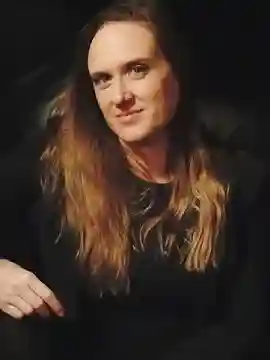
About the author
Jena Brown grew up playing make-believe in the Nevada desert, where her love for skeletons and harsh landscapes solidified. In addition to freelance writing, Jena blogs at www.jenabrownwrites.com. When she isn’t imagining deadly worlds, she and her husband keep busy being bossed around the Las Vegas desert by their two chihuahuas.
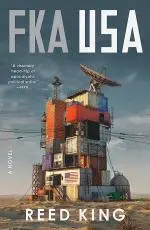 "FKA USA" by Reed King
"FKA USA" by Reed King
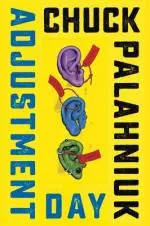 "Adjustment Day" by Chuck Palahniuk
"Adjustment Day" by Chuck Palahniuk
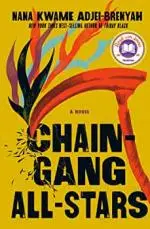 "Chain-Gang All-Stars" by Nana Kwame Adjei-Brenyah
"Chain-Gang All-Stars" by Nana Kwame Adjei-Brenyah
 "Vox" by Christina Dalcher
"Vox" by Christina Dalcher
 "American War" by Omar El Akkad
"American War" by Omar El Akkad
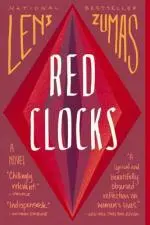 "Red Clocks" by Leni Zumas
"Red Clocks" by Leni Zumas
 "Future Home of the Living God" by Louise Erdrich
"Future Home of the Living God" by Louise Erdrich
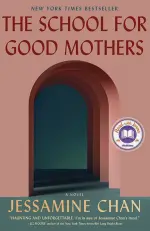 "The School for Good Mothers" by Jessamine Chan
"The School for Good Mothers" by Jessamine Chan
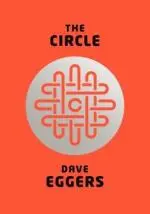 "The Circle" by Dave Eggers
"The Circle" by Dave Eggers








